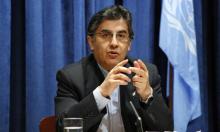Inaugural HOMEF Sustainability Academy 19-23 August 2013
Climate Change and the Looming Food Crisis
Sustainability Academy: Mobilisation through Knowledge
HOMEF is proud to announce its inaugural Sustainability Academy also known as HOME School. The Academy is a learning space that uses the vehicle of knowledge generation and sharing with the aim of provoking change. It is non-residential and has two sessions a year, each lasting one week and in multiple locations to enhance coverage and impact.
The maiden session will take be held 18-23 August 2013 in multiple locations while the second session will take place in November 2013.
Pablo Solon
Instigator for this inaugural School Session will be Ambassador Pablo Solón Romero served as Ambassador of the Plurinational State of Bolivia to the United Nations from February 2009 to July 2011 and is the former chief negotiator for his country at the UNFCCC.
He is currently the Executive Director of Focus on the Global South based in Thailand. An outspoken and clear thinker, Ambassador Solon led the Bolivian delegations to declare the true dangers inaction on climate change means to the planet and our collective future.
“We were accused of being obstructionist, obstinate and unrealistic. But we feel an enormous obligation to set aside diplomacy and tell the truth… Bolivia may have acted unusually by upsetting the established way of dealing with things. But we face an unprecedented crisis, and false victories won’t save the planet. False agreements will not guarantee a future for our children. We all must stand up and demand a climate agreement strong enough to match the crisis we confront.” – Pablo Solon in Why Bolivia stood alone in opposing the Cancún climate agreement http://www.guardian.co.uk/environment/cif-green/2010/dec/21/bolivia-oppo…
Nigeria is not a stranger to the impacts of climate change. Unusual weather patterns have visited heavy floods, conflicts and displacement of persons. The flooding experienced in Nigerian in 2012 displaced millions of Nigerians and exposed the challenges of emergency readiness and understanding of climate change impacts that will only be more severe in the coming years. Already the Nigerian meteorological agency has warned of more severe rainfall and flooding in Nigeria in 2013.
FOOD IMPACTS
The impact of climate change on food production has been documented. In Africa where agriculture is largely rain-fed, it has been predicted that yields could decline by as much as 50% by 2020. Africa is equally more vulnerable to global warming than other regions with 50% above average temperature rise. With largely inaction on carbon emissions reduction and continued reliance on polluting fossil fuels, the chance of keeping global temperature rise at below 2 degrees Celsius may already have been lost. We may be set to see temperature rise of up to 4 degrees above pre-industrial levels. What will this mean for food production in Nigeria and in Africa?
HS01 will be a platform to share knowledge and instigate action to avert a disaster both now and in the future. HS01 will be a multi-city school with focus on sectors as follows:
- Abuja: the audience will be national legislators; policy makers and Nigerian negotiators to the UNFCCC Conference Of Parties.
- Lagos: the audience will be undergraduate and post graduate students
- Benin City: two events will be held here – one with community people/farmers/CSOs and the second one with secondary school students.





